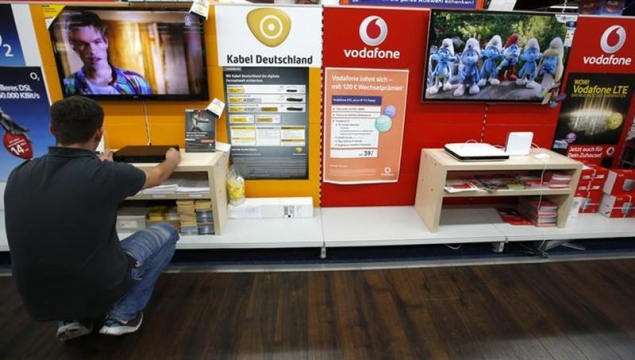- Home
- Telecom
- Telecom News
- MWC 2013: As mobile bills tumble, Europe's telcos aim to make data pay
MWC 2013: As mobile bills tumble, Europe's telcos aim to make data pay

Average mobile phone bills in Europe have fallen by 15 percent since 2007, even as they have risen by 25 percent in the United States. European users now spend an average of just 24 euros a month on their mobile phones, according to Sanford Bernstein. Americans spend about two thirds more.
But what is good for consumers' wallets is bad for firms, who grumble that unless they can make Europeans pay higher bills, they won't have the funds to build fast 4G and fibre broadband networks needed in the tablet and smartphone era.
For years, mobile phone operators have made most of their money by charging users for voice call minutes and text messages, perhaps with a mobile data plan thrown in.
But voice calls that made up more than 80 percent of revenue in 2007 now account for just 62.6 percent of cash flow for European firms, according to research firm Informa. Meanwhile, data volume is expected to double each year until 2015, according to industry group GSMA.
While details differ, European companies are all trying focus monthly charges on the part of their business that is growing - mobile data. But in highly competitive markets, few have yet found a formula to prod consumers to spend more.
"We understand better now how to price mobile services and data," said Gervais Pellissier, France Telecom's chief financial officer. "But not everything has been sorted out yet."
Firms like Vodafone and Telenor are responding by bundling unlimited voice and text messages with packages that vary in price based on how much data a customer wants. Others, like France Telecom and Britain's EE, charge a premium for the fastest 4G data speeds.
Eventually, European companies may follow U.S. firms in offering shared data plans, which let individuals and families buy data allowances that they can use on more than one device.
Fewer calls, more apps
What's clear is that customers are sending fewer of their messages through the traditional SMS text service, and making fewer of their calls over the voice network.
Many are shifting to apps like Skype, What's App, and Viber - or handset makers' features like Apple's Facetime and Blackberry's BBM - which let them communicate for free using their mobile data allowances.
"Around 18 months ago we started noticing that people were using more Skype, people were using Viber and What's App," Vodafone Chief Executive Vittorio Colao told the Mobile World Congress industry meeting, referring to three apps that let users route phone calls or messages through data plans.
"And our SMS revenues started going down. So we asked them why and it was a very simple answer. It was because it was free," he said. "So we decided to turn the model upside down."
Analysis firm Ovum forecasts that by 2016 global operators will have lost $54 billion in revenues due to the increasing popularity of messaging apps over text messages and phone calls.
While losing the battle to charge for minutes and texts, operators in Europe are trying to segment customers based on their data usage, like airlines separate passengers into business and economy class. Users on higher-priced deals of above 60 euros a month get faster mobile Internet speeds, larger data allotments and extra services like subsidised smartphones.
Swisscom has gone further than many by betting that consumers in a wealthy country will pay a big premium for fast data. Its prices are higher than elsewhere on the continent, but it says it has invested in a network that can handle large amounts of data at high speed.
Since June 2012, all its offers include unlimited calls, texts and mobile data. Users choose between a plan from 47-136 euros a month, depending on the Internet speed they want.
"I see many telecoms operators who no longer believe in their own business and because of that they don't invest anymore. It's a self fulfilling prophecy," Swisscom's Chief Executive Carsten Schloter said in an interview.
"Switzerland is not an island; the willingness to pay for quality also exists in other countries," he said.
To get mobile prices back up, some operators are planning to charge a premium for faster 4G networks. EE, the first to launch 4G in Britain, has chosen to charge higher prices for new service, but has not disclosed how many customers it has won.
EE paid 589 million pounds to buy more spectrum to extend its 4G coverage last week, and has promised to invest 1.5 billion over the next three years improving the network.
"If you're not different, if you don't have network innovation then yes, the only tool that you have is price," CEO Olaf Swantee told Reuters. "Network differentiation and service differentiation is the way to go for us."
But investors are not convinced that charging premiums for 4G will be a panacea. Customers may come to expect fast data, without wanting to pay extra for it.
Hutchison's Three, a challenger in Britain that offers "all you can eat data" plans for 25 pounds a month, has already pledged not to charge a premium for 4G when it launches the faster service this year.
In Norway, Telenor managed to increase its customers' monthly bills by 2 percent in 2012 - compared to a 4 percent decline at rival Teliasonera with a plan that squeezes more revenue out of data.
The group started a campaign in 2011 to prod users to sign up to the new bundles, which initially decreased the average monthly bill but paid off later.
Telenor Norway users on a typical 249 krones contract are limited to a modest 400 megabytes per month, plus calls and texts. Those who want more data have to pay extra.
But the firm has not been able to repeat the trick in neighbouring countries where competition is more intense. Telenor's similarly-priced packages in Denmark are a much better deal for its customers, offering up to 25 times as much data.
Shared data coming?
European companies are looking across the Atlantic for pricing ideas. U.S. mobile operators Verizon Wireless and AT&T, which share 70 percent of the market, have both introduced shared data plans. Families or individuals buy one mobile subscription with unlimited calls and texts, and get a data allowance that can be used on up to 10 different devices.
"Shared data plans have proven to be the winning strategy for data monetisation," Verizon Wireless Chief Technology Officer Nicola Palmer told Reuters.
The U.S. firms found that users were willing to pay more per megabyte of data - and buy more megabytes - because of the extra convenience of using their allowances on multiple devices. Europeans are taking note.
"Customers are evolving their usage across multiple screens - smartphones, tablets, cameras, dongles - so we need to be able to enable that kind of behavior," Ronan Dunne, who heads 02 Britain, told Reuters. Although he hinted that shared data plans were in the works at 02, he declined to give details.
Vodafone is also open to shared data plans, which would require behind the scenes technical work on its software, and France Telecom predicted their arrival in Europe by 2014.
© Thomson Reuters 2013
MWC 2013 in pictures
For details of the latest launches and news from Samsung, Xiaomi, Realme, OnePlus, Oppo and other companies at the Mobile World Congress in Barcelona, visit our MWC 2026 hub.
- Samsung Galaxy Unpacked 2026
- iPhone 17 Pro Max
- ChatGPT
- iOS 26
- Laptop Under 50000
- Smartwatch Under 10000
- Apple Vision Pro
- Oneplus 12
- OnePlus Nord CE 3 Lite 5G
- iPhone 13
- Xiaomi 14 Pro
- Oppo Find N3
- Tecno Spark Go (2023)
- Realme V30
- Best Phones Under 25000
- Samsung Galaxy S24 Series
- Cryptocurrency
- iQoo 12
- Samsung Galaxy S24 Ultra
- Giottus
- Samsung Galaxy Z Flip 5
- Apple 'Scary Fast'
- Housefull 5
- GoPro Hero 12 Black Review
- Invincible Season 2
- JioGlass
- HD Ready TV
- Latest Mobile Phones
- Compare Phones
- Apple iPhone 17e
- AI+ Pulse 2
- Motorola Razr Fold
- Honor Magic V6
- Leica Leitzphone
- Samsung Galaxy S26+
- Samsung Galaxy S26 Ultra
- Samsung Galaxy S26
- MacBook Pro 16-Inch (M5 Max, 2026)
- MacBook Pro 16-Inch (M5 Pro, 2026)
- Apple iPad Air 13-Inch (2026) Wi-Fi + Cellular
- Apple iPad Air 13-Inch (2026) Wi-Fi
- Huawei Watch GT Runner 2
- Amazfit Active 3 Premium
- Xiaomi QLED TV X Pro 75
- Haier H5E Series
- Asus ROG Ally
- Nintendo Switch Lite
- Haier 1.6 Ton 5 Star Inverter Split AC (HSU19G-MZAID5BN-INV)
- Haier 1.6 Ton 5 Star Inverter Split AC (HSU19G-MZAIM5BN-INV)











